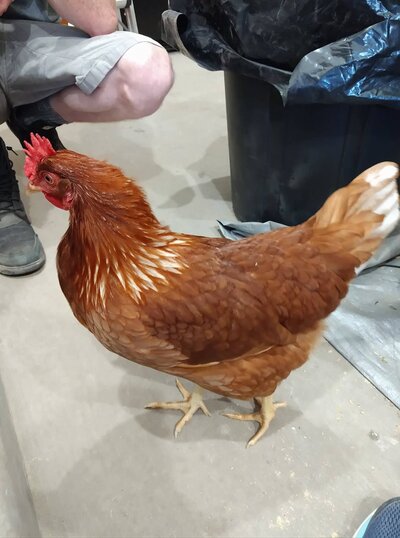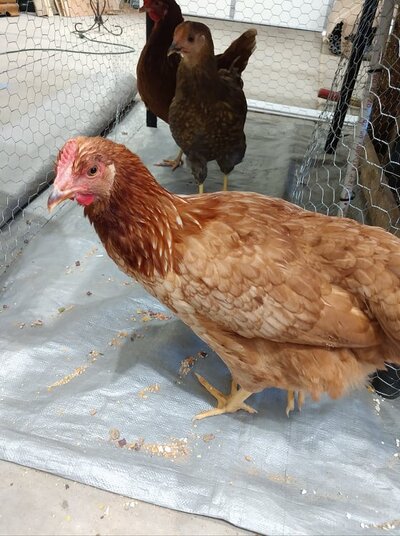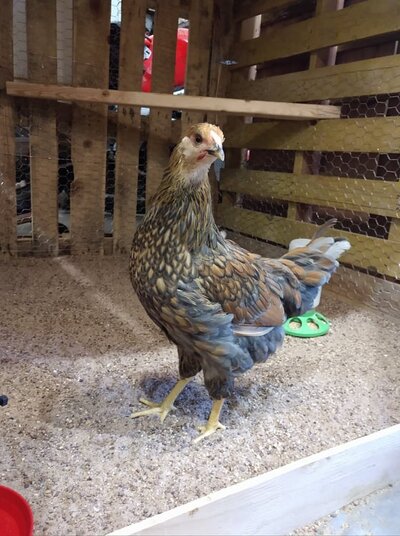Hi everyone, I am hoping to get some opinions from those with more experience. I have 3 new hens that are finishing up quarantine in about a week and a half. I am considering taking them to a vet for a well check before integrating as a couple have symptoms I am a little nervous about, but I am unsure how much a visual inspection could actually identify. It would help a ton if anyone is willing to read over what we are encountering and let me know whether it sounds like a vet trip would be wise, or do any good, or whether just a fecal float would be adequate. Each bird and observations noted below.
Lotus: Has Marek's and Coccidiosis shots. Laying well, good plumage, clear eyes and nose. Crop feels less hard than I am used to when full, but no odor or gurgling, empties overnight, and droppings are regular. Treated with Zimecterin Gold as one bird had confirmed tapeworm.

Sunshine: Has had Marek's and Coccidiosis shots. Not laying yet, plumage at saddle area is a bit rough, no missing feathers, clear eyes and nose. Was coughing upon arrival home and sneezing, this only continued for a few days, with fewer instances each day and has not re-occurred since. Confirmed tapeworm segments in droppings upon arrival home, treated with Zimecterin Gold, no segments observed since, but observation has been limited as they are in quarantine. We sit with them for an hour each evening.

Topaz: Unvaccinated (hopefully canary bird). Not laying yet, plumage at saddle area a bit rough, no missing feathers, clear eyes, occasional clear discharge at edge of nostril (very minimal) and occasional sneezing that may be due to being on sand litter for the first time and frequently wiping beak in it. Occasionally lies down for a moment while eating, but very active and coordinated the rest of the time. Came from overcrowded housing, so maybe she is used to laying low to avoid being shoved around? Have observed a couple of foamy yellowish brown droppings (not sulphur yellow), no foamy droppings recently but still the occasional light brown pudding consistency dropping with very strong smell (not like the cecal poop I have seen, this is more tan). Also had Zimecterin Gold treatment, first dose 8/15 last dose given on 8/26. Foamy poops were observed 8/19 and 8/20.

Everyone is eating and drinking, roosting, scratching in the litter, generally behaving the way a chicken should. Nobody appears in distress. They have been in quarantine for about 2.5 weeks. I am just not sure how much of this might be due to stress of the move, change in environment, change in diet etc. They were in very overcrowded, muddy conditions with flies everywhere before coming home with us. We will be integrating to a healthy flock so I want to be very careful how we proceed. Does any of this sound like it is more serious than internal parasites or changes to housing? Also do you see anything of concern in the photos I might have missed. If it sounds like they should be seen before being introduced I will schedule right away. Thanks so much everyone!
Lotus: Has Marek's and Coccidiosis shots. Laying well, good plumage, clear eyes and nose. Crop feels less hard than I am used to when full, but no odor or gurgling, empties overnight, and droppings are regular. Treated with Zimecterin Gold as one bird had confirmed tapeworm.

Sunshine: Has had Marek's and Coccidiosis shots. Not laying yet, plumage at saddle area is a bit rough, no missing feathers, clear eyes and nose. Was coughing upon arrival home and sneezing, this only continued for a few days, with fewer instances each day and has not re-occurred since. Confirmed tapeworm segments in droppings upon arrival home, treated with Zimecterin Gold, no segments observed since, but observation has been limited as they are in quarantine. We sit with them for an hour each evening.

Topaz: Unvaccinated (hopefully canary bird). Not laying yet, plumage at saddle area a bit rough, no missing feathers, clear eyes, occasional clear discharge at edge of nostril (very minimal) and occasional sneezing that may be due to being on sand litter for the first time and frequently wiping beak in it. Occasionally lies down for a moment while eating, but very active and coordinated the rest of the time. Came from overcrowded housing, so maybe she is used to laying low to avoid being shoved around? Have observed a couple of foamy yellowish brown droppings (not sulphur yellow), no foamy droppings recently but still the occasional light brown pudding consistency dropping with very strong smell (not like the cecal poop I have seen, this is more tan). Also had Zimecterin Gold treatment, first dose 8/15 last dose given on 8/26. Foamy poops were observed 8/19 and 8/20.

Everyone is eating and drinking, roosting, scratching in the litter, generally behaving the way a chicken should. Nobody appears in distress. They have been in quarantine for about 2.5 weeks. I am just not sure how much of this might be due to stress of the move, change in environment, change in diet etc. They were in very overcrowded, muddy conditions with flies everywhere before coming home with us. We will be integrating to a healthy flock so I want to be very careful how we proceed. Does any of this sound like it is more serious than internal parasites or changes to housing? Also do you see anything of concern in the photos I might have missed. If it sounds like they should be seen before being introduced I will schedule right away. Thanks so much everyone!




